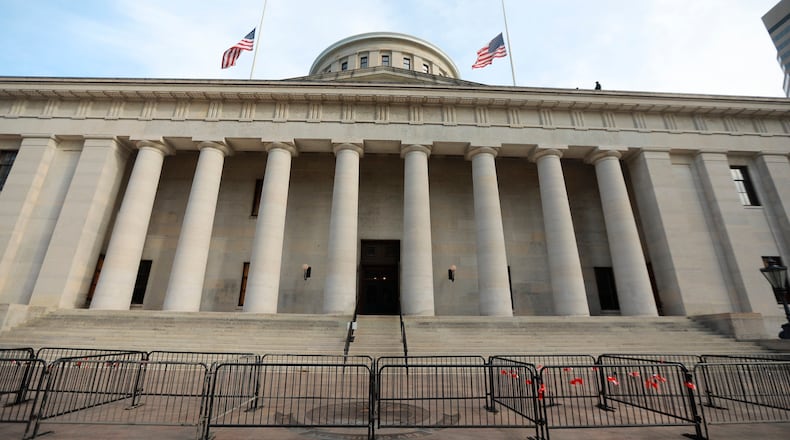The bill requires each state institution of higher learning to adopt a policy affirming free speech and publicize it, and establish a complaint process to report violations by those institutions’ employees, according to an analysis by the state Legislative Service Commission.
Principles required in that policy include:
- Stating that a public college or university is committed to allowing a free exchange of ideas, no matter if those ideas are considered “offensive, unwise, immoral, indecent, disagreeable, conservative, liberal, traditional, radical or wrong-headed.”
- Concerns about civility and mutual respect can’t be invoked to stifle discussion of those ideas.
- While students and faculty are free to contest views expressed by people invited to speak on campus, they can’t “substantially” obstruct or interfere with that speech.
- Faculty’s primary responsibility is to convey “the truth that lies in areas of their competence.”
Each institution must establish a complaint process, including for any grade penalty that is based on the student’s speech instead of “ordinary academic standards of substance and relevance.” Schools would have to investigate alleged violations, hold a hearing and determine a resolution. All such complaints and investigations must be reported to the state each year.
Institutions could still limit the time, place and manner of free expression, including use of university property and through classroom rules; set “reasonable viewpoint-neutral restrictions in nonpublic forums;” and do not have to allow disruption of previously scheduled activities in a public forum, according to the bill analysis.
Cirino said the bill includes a number of changes from its original version last June, such as removing free-speech policy requirements for K-12 schools.
State Rep. Catherine Ingram, D-Cincinnati, said the bill isn’t perfect, but that now protection for free speech “goes both ways,” bringing the bill a “far distance from its disastrous beginning.”
The bill also sets numerous other rules for state institutions, including:
- A requirement that creation of new degrees take into account the state’s workforce development priorities.
- Prohibiting extra fees for activities such as grading assignments that are associated with regular coursework.
- Charging more for online classes than the same in-person class.
- Creation of a one-time Second Chance Grant pilot program, a one-time payment of up to $2,000 for students who have exhausted financial aid but still have courses to complete. The state’s current budget includes $3 million for that purpose.
- Requiring state universities to establish joint enrollment programs with multiple community colleges.
- Require annual reports on costs of attendance and mental health.
- Prohibiting state schools from contacting with a company that is boycotting Israel “or other jurisdictions with whom Ohio can enjoy open trade.”
Property value challenges
House and Senate also agreed on Substitute House Bill 126, which changes the process for objecting to property tax valuations. It had already passed both chambers, but stalled March 2 when the House refused to agree to Senate amendments.
County auditors and other public officials who had previously supported the bill came out against the House amendment. Now both legislative chambers have accepted a conference committee report, sending the bill on to DeWine.
The bill sponsored by state Rep. Derek Merrin, R-Monclova Twp., has been in the works for several legislative sessions. Challenges to property valuations are often made by school districts against large commercial properties.
School districts will still be able to initiate those challenges, but will only be able to do so if the property has sold during the previous tax year; and the difference in valuation estimates must be at least $500,000, plus 10% of the sale value, according to state Sen. Louis Blessing, R-Colerain Twp. That $500,000 figure is also indexed to inflation.
Valuation challenges also cannot be appealed to the state Board of Tax Appeals except by the property owner, Blessing said.
School districts will be forbidden from making future “private pay” agreements, in which the property owner pays the district not to challenge a valuation; but such existing agreements will be grandfathered in.
Merrin called the conference committee’s work a “carefully crafted compromise” after talks between businesses, schools, legislators and county auditors
“This is a process where all parties got amendments,” he said.
Some Democrats still objected. State Sen. Sandra Williams, D-Cleveland, said the bill will likely limit challenges to valuations over $5 million, meaning schools in small communities would have few opportunities to argue about the property tax funding they receive.
State Rep. Beth Liston, D-Dublin, said it will limit even large districts; Columbus City Schools estimate the change could cost them $3 million each year, she said.
Nursing home visitation
Nursing homes, hospices and other long term care facilities will be required to allow visits to patients during future disease outbreaks and other emergencies under House Bill 120, which passed the House in March 2021 and won Senate approval Wednesday.
The House immediately and unanimously accepted Senate amendments, giving the bill final approval.
State Sen. Steve Huffman, R-Tipp City, said the bill requires those medical facilities to develop and publicize policies allowing for compassionate care visits. That covers family, clergy and others, though facilities are allowed to set health precautions.
About the Author

